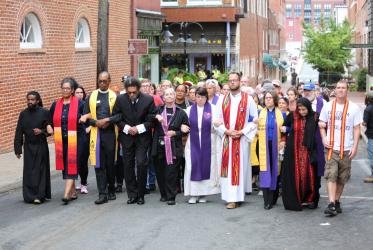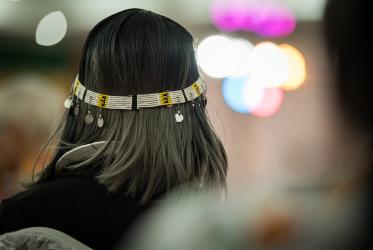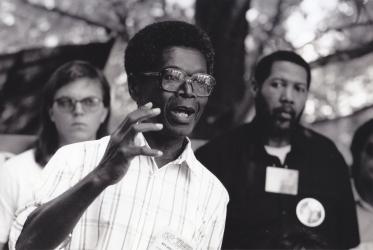The legacies of the slave trade, and how churches can respond to past and present forms of slavery, are going to be discussed at an ecumenical conference to be held 10-14 December in Runaway Bay, Jamaica. About sixty theologians, church leaders, social scientists and activists, mainly from Africa, the Americas and the Caribbean will gather in the country where nearly one million Africans and later indentured servants from Asia were exploited as human commodities and many more transited on their often deadly passage into slavery.
"Rather than a mere commemoration of 1807's abolition of the Britain's trans-Atlantic slave trade the conference is an audit of the patterns that it established and that remain active today," says Deenabandhu Manchala, programme executive for just and inclusive communities with the World Council of Churches (WCC). Narratives, drama, music and dance are the means by which participants will share their peoples' stories of pain in a Balm Yaad - that is how the Jamaican tradition calls a place for ritual healing.
Remembering the church that existed 200 years ago as a threatened and enslaved community in the dungeons and ports, the ranches and plantations, bearing witness to the prophetic hope of liberation through resistance and revolt, the conference will celebrate those African cultures and spiritualities that made this witness possible. It will also affirm the struggles of the Dalits in India, the indigenous peoples and those others who are resisting different forms of slavery today, including human trafficking.
A final statement will challenge the churches and the ecumenical movement to address the historical debt which those who profit from a wealth built on the exploitation of nature and human kind owe to those who suffer most from its consequences. It will explore questions such as: What do repentance and reparations mean? What are their concrete and tangible expressions? How does the church uphold the cause of justice on behalf of the slain Abels of our world? Is it possible to unmask the race bias of economic globalization and thus expose its potential to institutionalize injustice, legitimize cultures of exclusion and further commodify the human person?
The international ecumenical conference "Abolished, but not destroyed: Remembering the slave trade in the 21st century" is co-organized by the WCC, the World Alliance of Reformed Churches and the Council for World Mission and hosted by the United Church in Jamaica and the Cayman Islands.
More information on WCC work on overcoming racism
Website of the World Alliance of Reformed Churches
Website of the Council for World Mission
Website of the United Church in Jamaica and the Cayman Islands
Media contact in Jamaica: United Church in Jamaica and the Cayman Islands, synod office, Tel: (+876) 926 6059, churchunited [at] hotmail.com; synod [at] unitedchurchja.com








